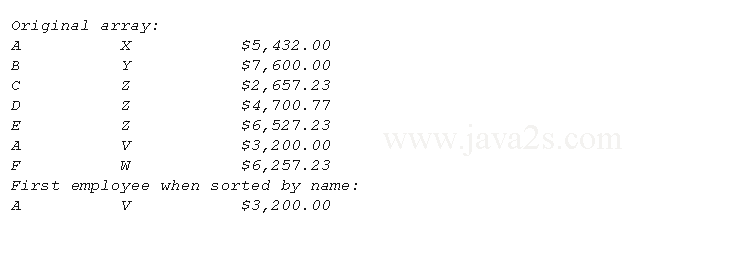Order the employees by last name, then first name - CSharp LINQ
CSharp examples for LINQ:order by
Description
Order the employees by last name, then first name
Demo Code
using System;/*from ww w . j av a2 s.c om*/ using System.Linq; class LINQWithArrayOfObjects { static void Main() { // initialize array of employees var employees = new[] { new Employee("A", "X", 5432M), new Employee("B", "Y", 7600M), new Employee("C", "Z", 2657.23M), new Employee("D", "Z", 4700.77M), new Employee("E", "Z", 6527.23M), new Employee("A", "V", 3200M), new Employee("F", "W", 6257.23M)}; // display all employees Console.WriteLine("Original array:"); foreach (var element in employees) { Console.WriteLine(element); } // order the employees by last name, then first name with LINQ var nameSorted = from e in employees orderby e.LastName, e.FirstName select e; // header Console.WriteLine("\nFirst employee when sorted by name:"); // attempt to display the first result of the above LINQ query if (nameSorted.Any()) { Console.WriteLine(nameSorted.First()); } else { Console.WriteLine("not found"); } } } class Employee { public string FirstName { get; } // read-only auto-implemented property public string LastName { get; } // read-only auto-implemented property private decimal monthlySalary; // monthly salary of employee public Employee(string firstName, string lastName,decimal monthlySalary) { FirstName = firstName; LastName = lastName; MonthlySalary = monthlySalary; } // property that gets and sets the employee's monthly salary public decimal MonthlySalary { get { return monthlySalary; } set { if (value >= 0M) // validate that salary is nonnegative { monthlySalary = value; } } } // return a string containing the employee's information public override string ToString() => $"{FirstName,-10} {LastName,-10} {MonthlySalary,10:C}"; }
Result
